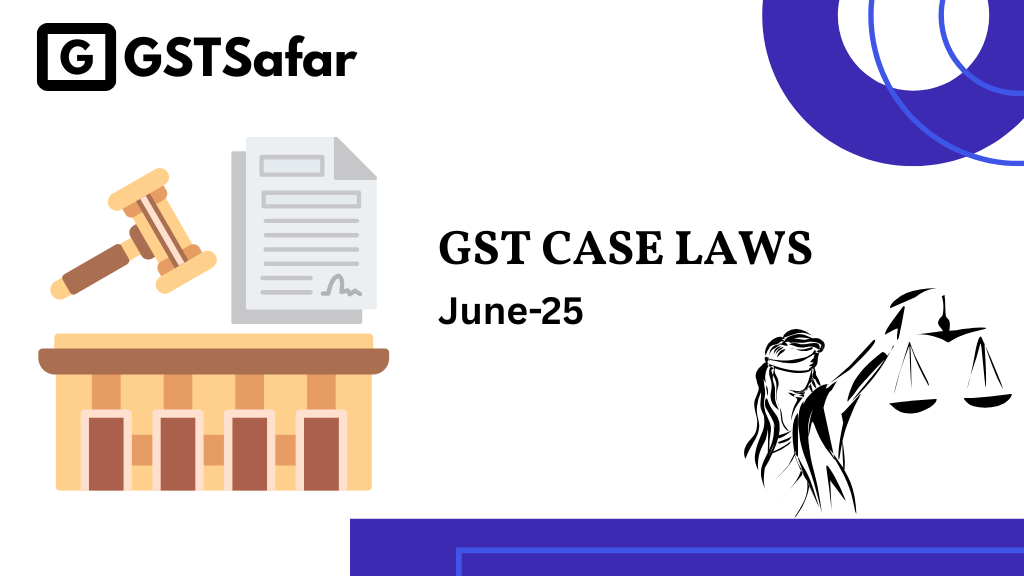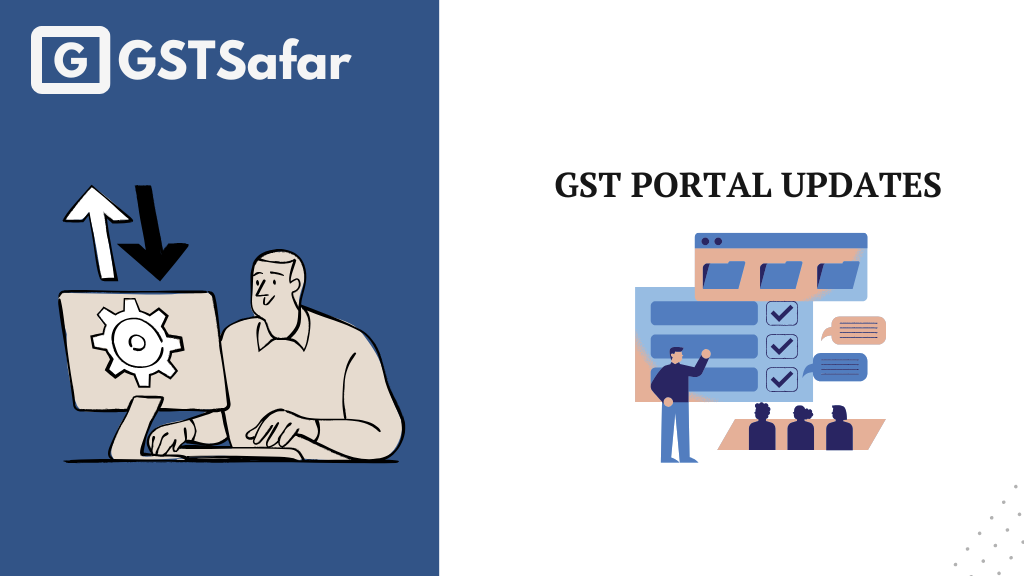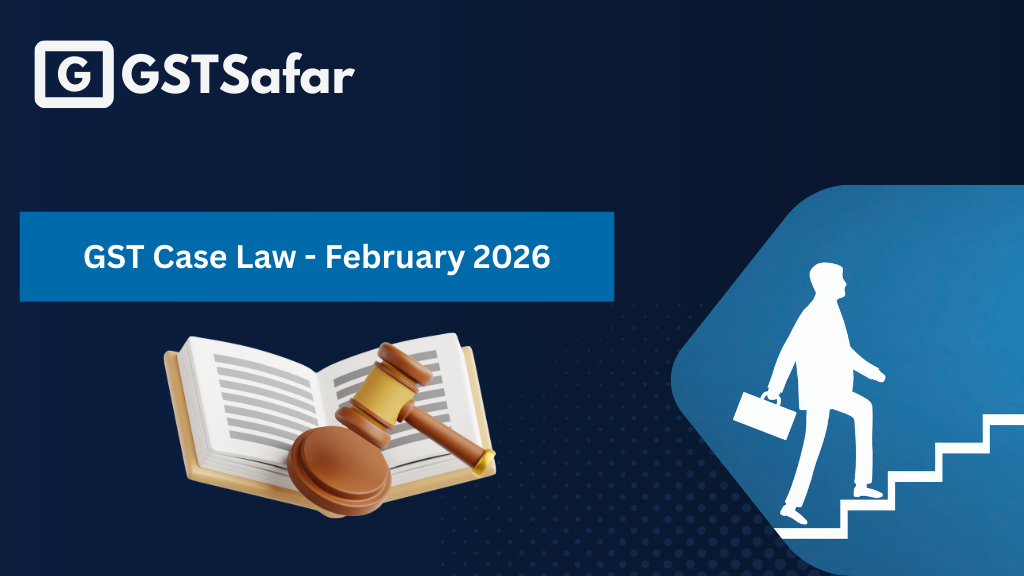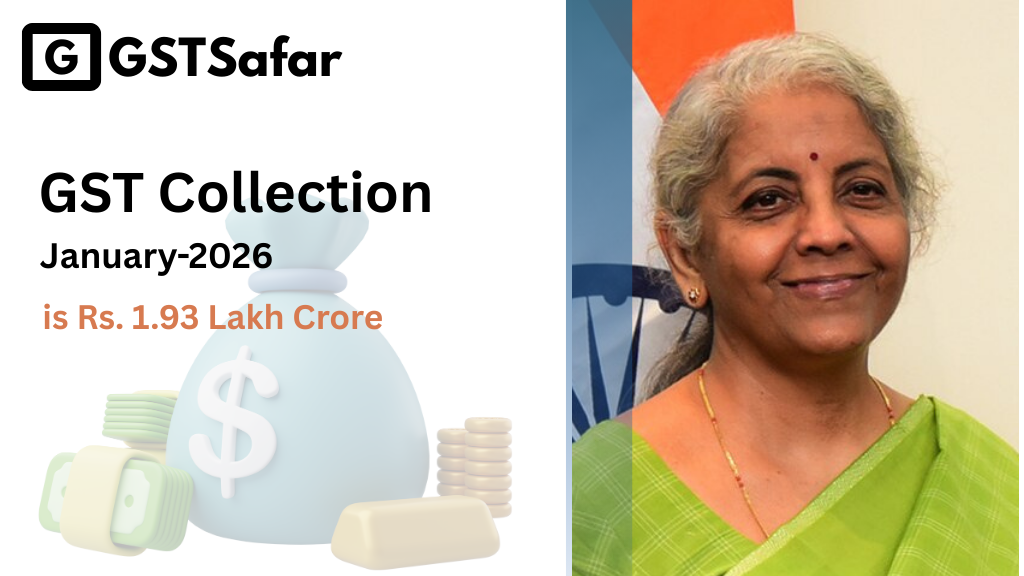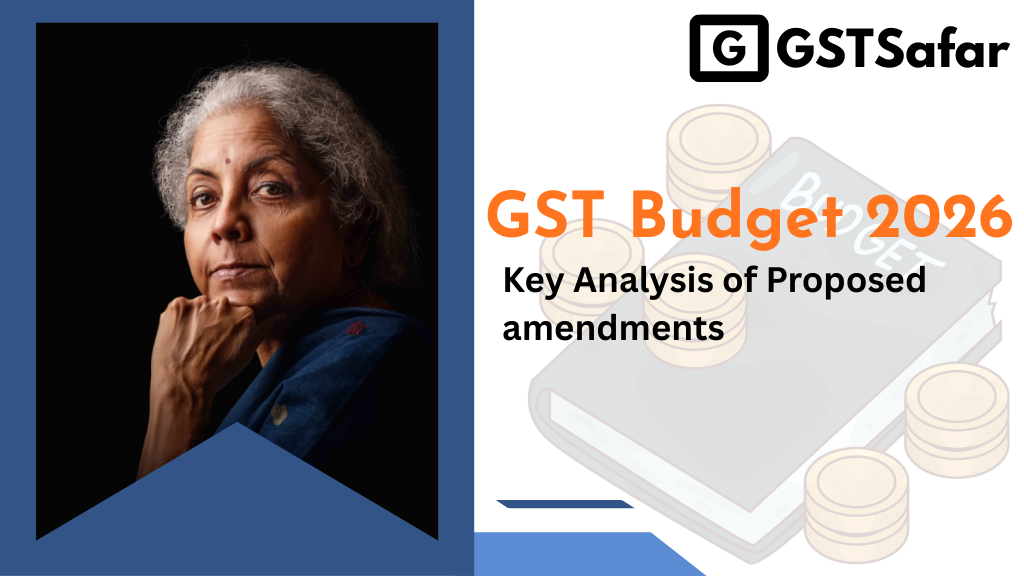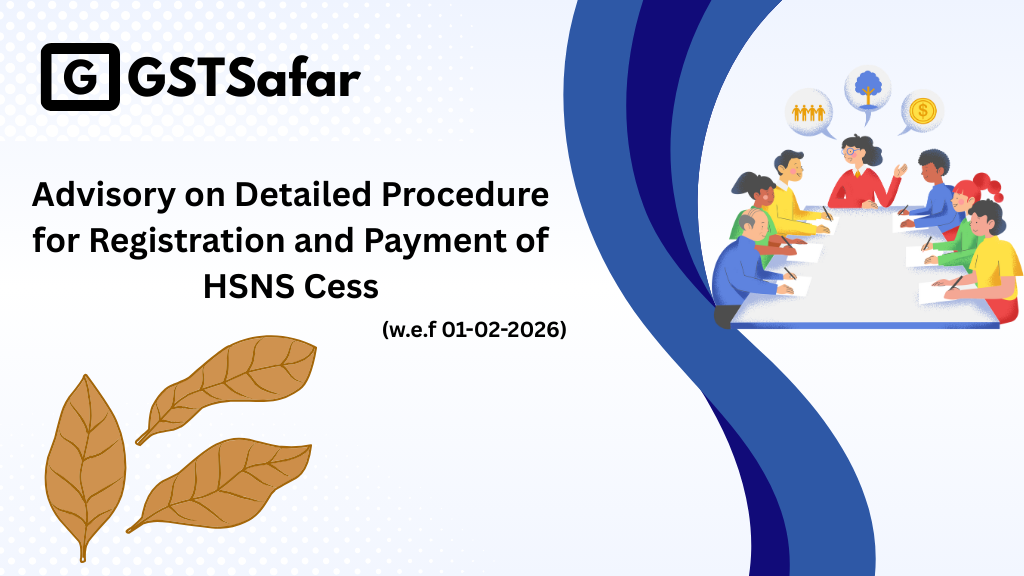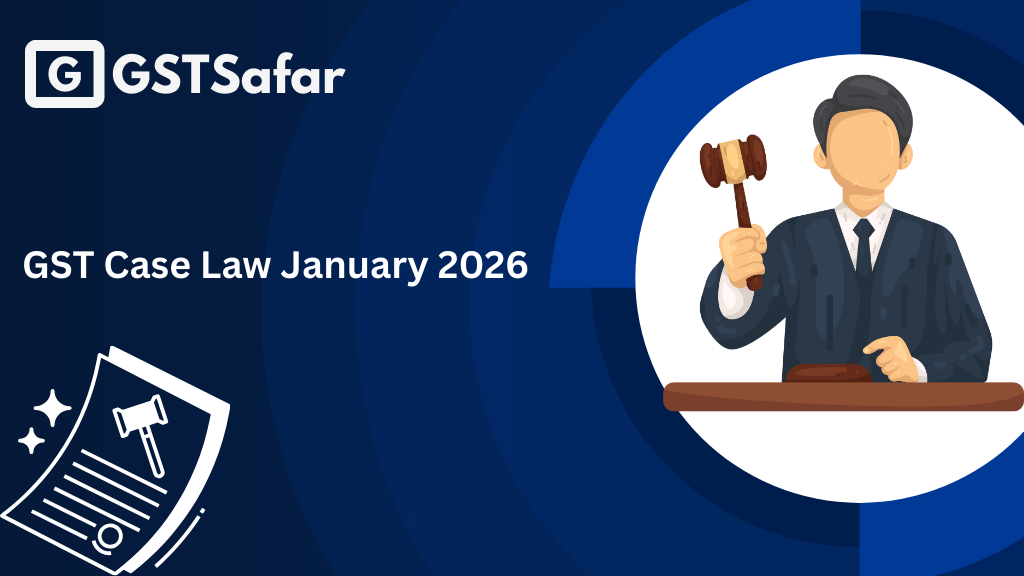Table of Contents
ToggleGST Case Laws June 2025
The goal of this article is to cover all recent GST case laws June 2025. All latest high court judgments on gst and all the latest Supreme Court judgments on gst issued in June 2025 have been covered in this article. All the latest GST case laws of June 2025 in this article have been classified by name, date, judge, counsel, GST concept, GST section, etc. In addition, a PDF of the GST case law is provided with the case law so that the user can download it for further study.
GST Case law on Rectification of Records
Madras High Court decided to cancel (set aside) the impugned order and send the matter back to the department for fresh consideration, giving the assessee an opportunity to be heard properly.
| Madras High Court Judgement 2025 |
| Name of case: Tvl. Monikandan (W.C) vs. Deputy State Tax Officer |
| Date of Judgment: 16-06-2025 |
| Appeal No: W.P (MD) No.16036 of 2025 W.M.P (MD) No.12128 of 2025 |
| Judges: C. Saravanan, J. |
| Counsel Name: A. Satheesh Murugan |
Fact of the Case: In this case, a show cause notice was issued to the assessee proposing a demand of Rs. 14.88 lakh along with interest. The assessee’s contention was that even before filing a reply to the show cause notice, he had already paid the entire amount of Rs. 14.88 lakh. Despite this, the department passed an order confirming a further demand of Rs. 6.82 lakh. Aggrieved by this, the assessee filed an application for rectification under section 161 of the GST Act, arguing that there was a clear error in the order since the payment had already been made. However, the department rejected the rectification application on the ground that the error pointed out did not qualify as an “error apparent on the face of record,” which is a requirement under section 161 for rectification. The assessee then approached the High Court by filing a writ petition, claiming that rejecting the rectification without considering the actual payment and without giving proper opportunity amounted to a violation of principles of natural justice, and seeking appropriate relief against the demand. |
Held by court : After considering the submissions and examining the impugned order, the court found that there was a clear violation of the principles of natural justice. This means the assessee was not given a fair chance to present their case properly before the order was passed. Because of this, the court decided to cancel (set aside) the impugned order and send the matter back to the department for fresh consideration, giving the assessee an opportunity to be heard properly. |
| In favor of : Assessee |
| Topic of GST : Rectification of Mistakes |
| Section of GST: Section 161 of CGST Act, 2017 |
Downlaod PDF of Madras High Court Judgement on Monikandan
GST Case law on Creation of Fake Firms and Fraudulent Passing of Input Tax Credit
Rajasthan High Court says the petitioner was not entitled to bail and accordingly dismissed his bail application.
| Rajasthan High Court Judgement 2025 |
| Name of case: Ankit Bansal vs. Union of India |
| Date of Judgment: 18-06-2025 |
| Appeal No: S.B. Criminal Miscellaneous Bail Application No. 4836 of 2025 |
| Judges: ANAND SHARMA (V. J.), J. |
| Counsel Name: Swadeep Singh Hora, T.C. Sharma, Dinesh Bishnoi, Ms. Varuni Agarwal and Siddhant Choudhary |
Fact of the Case: In this case, an internal auditor was arrested on the allegation that he had created fake firms and fraudulently passed on fake input tax credit (ITC) to various beneficiaries, causing significant loss to the revenue. It was alleged that the auditor played a key role in preparing fake documents and facilitating the issuance of bogus invoices without actual supply of goods or services. Following his arrest, the auditor filed a bail application before the appropriate court. While considering the bail plea, the court examined the seriousness of the offense, the extent of involvement of the accused, and the potential impact on ongoing investigations. Given the gravity of the allegations and the large revenue implications, courts often adopt a strict approach in such cases and may deny bail if they believe the accused could tamper with evidence or influence witnesses. |
Held by court : In this case, there were serious allegations against the petitioner for creating as many as 353 fake or non-existent firms with the intention of issuing fake invoices and fraudulently passing on input tax credit (ITC) to various beneficiaries. The total amount involved was extremely large, around Rs. 704 crores, which posed a significant threat to the national economy. The alleged offenses clearly fell under the category of economic offences, which are considered grave because they involve deep-rooted conspiracies, breach of trust, and cause huge losses to the public exchequer. Such white-collar crimes are viewed as more dangerous than ordinary crimes since they are carried out with careful planning and deceit, ultimately affecting the economic health of the country. Additionally, it was noted that the petitioner had attempted to abscond, further indicating his non-cooperative attitude. Considering the magnitude of the fraud, the serious nature of the allegations, and the petitioner’s conduct, the court held that he was not entitled to bail and accordingly dismissed his bail application. |
| In favor of : Revenue |
| Topic of GST : Bail |
| Section of GST: Section 132 of CGST Act, 2017 |
Download PDF of Rajasthan High Court Judgeemnt on Ankit_Bansal
GST Case law on Denial of Input Tax Credit
Madras High Court says assessee had no valid grounds to challenge the impugned order through a writ petition.
| Madras High Court Judgement 2025 |
| Name of case: Tvl. M. Reddiapatti Industries Sales Society vs. Deputy State Tax Officer, Aruppukottai Assessment Circle, Virudhunagar |
| Date of Judgment: 16-06-2025 |
| Appeal No: W.P (MD) No.16051 of 2025 W.M.P (MD) No.12144 of 2025 |
| Judges: C. Saravanan, J. |
| Counsel Name:Rajakarthikeyan |
Fact of the Case: A show cause notice was issued to the assessee because there was a mismatch between the turnover reported in GSTR-1 and GSTR-3B, which led the department to suspect incorrect reporting and possible wrongful availment of input tax credit (ITC). In response, the assessee submitted a detailed reply explaining the reasons for the mismatch. However, despite this reply, the department passed an adverse order (called the impugned order), denying the ITC and raising a tax demand against the assessee. Feeling aggrieved by this order and believing that their reply was not properly considered, the assessee chose to challenge the order by filing a writ petition before the High Court. Though normally the assessee is required to file an appeal through the regular statutory mechanism, they approached the High Court directly under its writ jurisdiction, mainly on the ground that there was a violation of the principles of natural justice as their explanation was not adequately examined. |
Held by court : In this case, it was observed that the assessment order was passed on 2-1-2024, but the assessee filed the present writ petition only after the statutory period prescribed under section 117 for filing an appeal had expired. This delay indicated that the assessee had not availed the proper appellate remedy within the prescribed time. Moreover, it was also noted that in its reply to the show cause notice, the assessee had already admitted part of the tax liability. Considering these facts and circumstances, the court held that the assessee had no valid grounds to challenge the impugned order through a writ petition. Therefore, the petition was liable to be dismissed not only on the ground of delay (laches), but also because of the assessee’s own admission of liability, which weakened its case further. |
| In favor of : Revenue |
| Topic of GST : Input Tax Credit |
| Section of GST: Section 117 of CGST Act, 2017 |
Downlaod PDF of Madras High Court Judgement on M.Reddiapatti Industries Sales
GST Case law on Refund of Credit Ledger in case of Closure of Business
The Sikkim High Court says a refund of ITC on closure of business is allowed on the principle that the law does not permit the retention of tax without legal authority.
| Sikkim High Court Judgement 2025 |
| Name of case: SICPA India Pvt limited VS Union of India and Others |
| Date of Judgment: 10-06-2025 |
| Appeal No: WP(C) No 54 of 2023 |
| Judges: Meenakshi Madan Rai, J. |
| Counsel Name: Ms. Ankit Kanodia and Mr. Passang Tshering Bhutia |
Fact of the Case: SICPA sought refund of unutilized Input Tax Credit (ITC) amounting to ₹4.37 crores lying in their Electronic Credit Ledger after discontinuation of business in Sikkim.The Assistant Commissioner (CGST) rejected the refund citing Section 54(3) of the CGST Act, which permits refund of unutilized ITC only in cases of: Zero-rated supplies made without payment of tax, or Accumulation of credit due to inverted duty structure. Petitioner argued that Section 49(6) of the CGST Act allows refund of balance in the Electronic Credit Ledger after payment of tax, interest, and penalties. This provision does not restrict refund only to cases listed under Section 54(3).Denying refund amounts to violation of vested rights, especially when ITC has already been reversed appropriately during closure. Respondents’ Argued that : Refund is not permitted on closure of business. Section 49(6) does not independently grant a refund right; it is subject to Section 54. Section 29(5) only provides for ITC reversal, not refund, on cancellation. Petitioner had not exhausted statutory appellate remedy under Section 112. |
Held by court : Court ruled that non-availing of alternate remedy is not an absolute bar to maintain a writ petition. Cited Supreme Court rulings (Godrej Sara Lee, Indian Hume Pipe) to affirm discretion of High Court under Article 226. Section 49(6) allows refund of Electronic Credit Ledger balance “in accordance with Section 54.” Though Section 54(3) specifies limited cases for ITC refund, there is no express prohibition against refund on business closure.Retention of tax without authority of law is impermissible. Refund of unutilized ITC was allowed despite absence of express provision when business was closed. The Court held that SICPA India Pvt. Ltd. is entitled to refund of the unutilized ITC. The Appellate Authority’s order dated 22.03.2023 was set aside. The Writ Petition was allowed and the refund claim was directed to be processed. |
| In favor of : Assessee |
| Topic of GST : Refund |
| Section of GST: Section 54 & 49 of CGST Act, 2017 |
Download PDF of Sikkim High Court Judgement on SICPA India Pvt Ltd.
GST Case Law on refund of unutilized ITC
Bombay High Court says the assessee was rightly eligible for refund of unutilized ITC in accordance with the provisions of Section 16(3).
| Bombay High Court Judgement 2025 |
| Name of case: Sundyne Pumps and Compressors India (P.) Ltd. vs. Union of India |
| Date of Judgment: 16-06-2025 |
| Appeal No: WRIT PETITION NO. 15228 OF 2023 |
| Judges: B.P. Colabawalla and FIRDOSH P. POONIWALLA, JJ. |
| Counsel Name: Prakash Shah, Jas Sanghavi, Mohit Raval and Vikas Poojary |
Fact of the Case: In this case, the assessee, an Indian company, was engaged in providing design and engineering services to its group companies located outside India. For the earlier periods—April 2020 to March 2021 and April to June 2021—the assessee had filed refund applications for unutilized Input Tax Credit (ITC) on account of zero-rated supplies (exports of services), which were duly sanctioned by the department. Notably, the department did not prefer any appeal against the grant of refund for those periods, thereby accepting the classification of the services as exports. Subsequently, the assessee filed refund claims for the periods July to September 2021 and October to December 2021. However, these were rejected by the department on the ground that the assessee was acting as an agent of the foreign recipient, and thus, the services did not qualify as “export of services” under the Integrated Goods and Services Tax (IGST) Act. As a result, the department held that the supplies were not zero-rated and the refund of ITC was not admissible. The rejection, despite no change in the nature of services or business model, appears inconsistent with the department’s own acceptance of similar claims for earlier periods. This raises concerns regarding the arbitrary interpretation of the law and violates the principle of consistency in tax administration, unless supported by fresh facts or legal grounds justifying a different treatment. |
Held by court : In this case, the core issue revolved around whether the services provided by the assessee to its foreign group companies qualified as “export of services” under GST, making them zero-rated supplies and thereby eligible for refund of unutilized Input Tax Credit (ITC). The department had rejected the refund claims for certain periods on the ground that the assessee acted as an agent of the foreign recipient, and hence the services did not qualify as export. However, this reasoning was unfounded in law. Circular No. 161/17/2021-GST, issued by CBIC, clearly clarified that even if services are provided to a related party located outside India, such supplies would still qualify as exports, provided all conditions laid down under Section 2(6) of the IGST Act are satisfied. Importantly, the definition of “agent” under the GST law requires the agent to supply goods or services on behalf of another person, which implies the presence of a third party in the transaction. In the present case, the transaction was solely between the assessee and its foreign group company—there were only two parties involved, and no third party existed. Therefore, the assessee could not be considered as an agent, and the principal-agent relationship did not arise. Furthermore, merely providing services to group, sister, holding, or subsidiary companies located outside India does not make the Indian entity a “mere establishment” of the foreign company under GST law, especially when both entities are independent and incorporated separately. Hence, it was held that the services provided by the assessee were genuine exports of services, qualifying as zero-rated supplies, and thus, the assessee was rightly eligible for refund of unutilized ITC in accordance with the provisions of Section 16(3) of the IGST Act read with Rule 89 of the CGST Rules. The department’s rejection lacked merit and contradicted both prior approvals and statutory clarifications. |
| In favor of : Assessee |
| Topic of GST : Refund in case of Export of Service |
| Section of GST: Section 54 of CGST Act, 2017, Rule 89 of CGST Rules,2017 |
GST Case laws on Cancellation of Registration
Gauhati High Court says the proper officer has the discretion to drop the cancellation proceedings.
| Gauhati High Court Judgement 2025 |
| Name of case: Debasish Boruah vs. Union of India |
| Date of Judgment: 06-06-2025 |
| Appeal No: WP (C) No. 3149 OF 2025 |
| Judges: Arun Dev Choudhury, J. |
| Counsel Name: R S Mishra, Ms M Nirola and A K Gupta |
Fact of the Case: In this case, the assessee’s GST registration was cancelled by the department on the ground of non-filing of returns for a continuous period of six months, which is a valid reason for cancellation under Section 29(2)(c) of the CGST Act, 2017. However, the assessee submitted before the authority that the failure to file returns was not deliberate, and that they were now ready and willing to comply with all requirements. This included the filing of all pending GST returns and making full payment of the tax dues, along with applicable interest and late fees. The assessee essentially sought restoration (revocation) of the cancelled registration, expressing their intent to regularize the default. Courts and appellate authorities have consistently held that revocation of cancellation may be allowed in such cases where the assessee shows bona fide conduct, readiness to comply, and where the revenue interest is protected through tax recovery with applicable dues.The approach aligns with the principle of allowing genuine taxpayers a chance to continue business and comply voluntarily, especially when there is no intention of tax evasion or fraud. Therefore, where the assessee undertakes to clear all liabilities and comply with filing obligations, authorities are generally expected to consider restoration of registration in the interest of justice and revenue collection. |
Held by court : When a taxpayer’s GST registration is cancelled due to reasons such as non-filing of returns for a continuous period, the law provides an opportunity for rectification before the cancellation becomes final. If a Show Cause Notice for cancellation is issued in Form GST REG-17, and the taxpayer responds within the prescribed time by furnishing valid reasons—such as committing to file all pending returns and pay the applicable tax, interest, and late fee—the proper officer has the discretion to drop the cancellation proceedings. In such cases, if the officer is satisfied that the taxpayer has complied with the requirements and there is no intention of tax evasion, they may pass an order in Form GST REG-20 for dropping the cancellation proceedings. This order effectively restores the GST registration without requiring the taxpayer to file a separate revocation application. Thus, Form GST REG-20 serves as a mechanism for administrative relief, allowing the taxpayer to regularize their non-compliance and continue their business operations under the same GSTIN. |
| In favor of : Assessee |
| Topic of GST : Registration |
| Section of GST: Section 29 of CGST Act, 2017 & Rule 22 of CGST Rules,2017. |
Download PDF of Gauhati High Court on Debasish Boruah
GST Case law on Denial of ITC Solely Due to Supplier’s Retrospective Cancellation Unsustainable
Himachal Pradesh High Court says the matter was remanded back to the Adjudicating Authority with a direction to re-examine the case
| Himachal Pradesh High Court Judgement 2025 |
| Name of case: Himalaya Communication (P.) Ltd. vs. Union of India |
| Date of Judgment: 06-06-2025 |
| Appeal No: CWP No.8809 of 2025 |
| Judges: Tarlok singh chauhan and Sushil Kukreja, JJ. |
| Counsel Name: Ravinder Pal Jindal and Goverdhan Lal Sharma |
Fact of the Case: In this case, the assessee challenged an order denying Input Tax Credit (ITC) solely on the ground that the GST registration of the supplier had been cancelled retrospectively. The department rejected the ITC claim without examining the genuineness of the underlying transaction—such as whether the goods or services were actually received and whether the payment was made with tax charged. Instead of conducting a proper inquiry into the factual aspects of the transaction, the authorities proceeded to issue a notice directly under Section 16(2) of the CGST Act, 2017, which governs the eligibility conditions for availing ITC. Importantly, there was no material on record to suggest that the assessing authority or the appellate authority had assessed whether the transaction was genuine or fraudulent. Courts have consistently held that ITC cannot be denied automatically merely because of cancellation of the supplier’s registration, especially with retrospective effect, unless it is established that the transaction was not genuine or there was collusion or fraud. The absence of such inquiry renders the denial of ITC arbitrary and unsustainable in law. |
Held by court : In this case, before denying the assessee’s claim for Input Tax Credit (ITC), the authorities were expected to first examine the genuineness of the transaction. This assessment could only have been made after verifying all relevant documents, such as tax invoices, proof of payment, receipt of goods or services, and other supporting records. However, no such examination was carried out by the assessing or appellate authority in the present case. The decision to reject ITC was taken solely based on the retrospective cancellation of the supplier’s GST registration, without any inquiry into whether the underlying supply was actually made. As a result, the impugned orders were found to be premature and legally unsustainable. Therefore, the matter was remanded back to the Adjudicating Authority with a direction to re-examine the case after proper verification of documents and facts, ensuring a fair opportunity for the assessee to present their case. |
| In favor of : Assessee |
| Topic of GST : Input Tax Credit |
| Section of GST: Section 16 of CGST Act, 2017 |
Download PDF of Himachal Pradesh High Court Judgement on Himalaya Communication (P.) Ltd .
